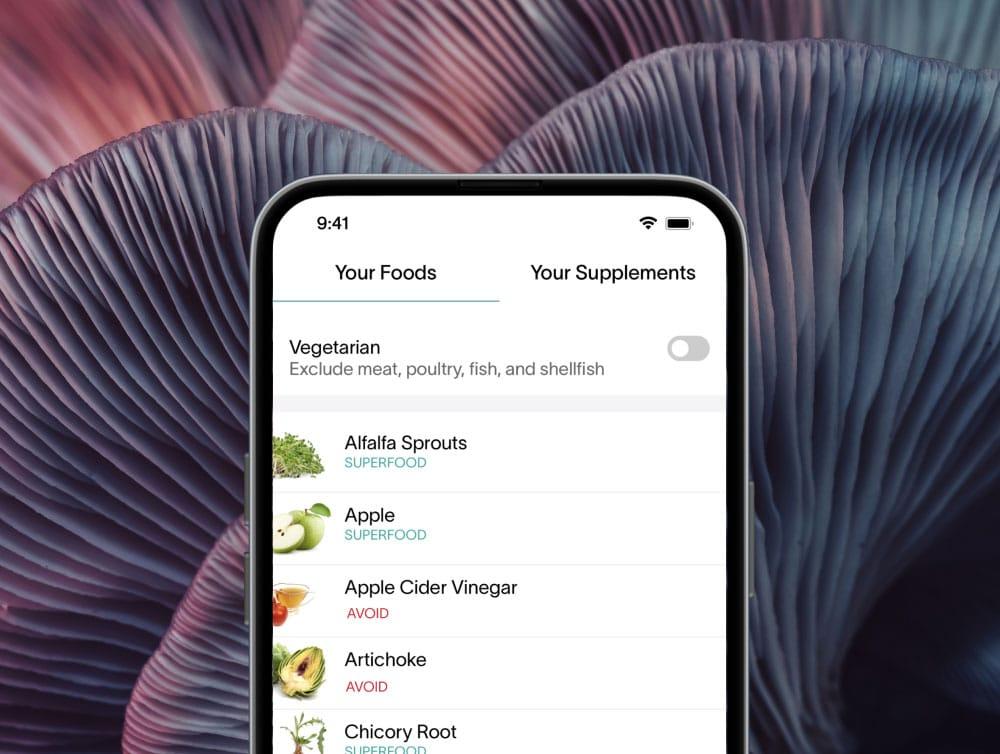
For years, the approach to supplements has been simple: wander down store aisles, chase social media trends, or copy a friend’s regimen. Science and technology have evolved, and its time our approach to supplements does too.
The reality is, current nutritional practices don’t account for individual biochemistry. While DNA provides a starting point, your current biochemical state is largely driven by genetic expression based on lifestyle and environment.[1] If you present symptoms to three nutritionists, you’ll likely get three different recommendations–and even more varied recommendations for supplementation. This scattergun approach often overlooks your individual biology.
Fad diets are a glaring example of this ineffective one-size-fits-all mentality. Despite strong evidence linking diet to chronic diseases, advice remains contradictory. For instance, saturated fats are both demonized and praised in discussions about cardiovascular and metabolic health [2,3]. The controversy extends to fruit juice – some studies link it to increased cancer rates [4], while others tout its health benefits [5,6]. Add to this the sway of industry interests over food guidelines, and it’s clear: USDA standards, relying on population averages, fail to address personal needs [7].
Genetics play a secondary role compared to the microbiome in the health impacts of nutrition. A substantial twin study revealed significant variability in metabolic responses to identical meals [8]. The microbiome’s influence is vast, affecting everything from neurotransmitter production to immunity and metabolism [8]. Nutrition should ideally account for individual biochemistry, driven largely by the microbiome, not one-size-fits-all guidelines.
Thanks to advancements in science and technology, we are entering a groundbreaking era of precision health. In this era, every individual has the power to manage their unique nutritional needs effectively.
Personalized supplements are the future, transcending mere questionnaires. Our bodies are complex ecosystems, signaling our specific nutrient requirements based on our unique inner environments. With the right tools, we can tailor our supplement routines to these signals.

Viome, a pioneering health tech company, is leading this revolution with its personalized supplement system. It starts with their Full Body Intelligence Test – the most comprehensive at-home microbiome analysis available. This test analyzes your gut microbiome, oral microbiome, and cellular health by looking at RNA gene expression. It identifies and illuminates how your unique lifestyle, particularly what you eat, impacts your health, setting the stage for personalized health solutions that address root causes and improve microbiome health with personalized nutrition for better digestion.
Viome’s supplements stand apart, crafted with intentional, premium ingredients in dosages tailored to your test results. You also get individualized insights and personalized nutritional recommendations. They will even create a custom supplement formula and personalized biotics. This is total body wellness in your own hands.
To fully embrace this new supplement paradigm, let’s debunk four key misconceptions
- Whole Foods Provide All Nutrient Needs
While essential, whole foods often fall short in modern diets. Nutrient depletion from agricultural practices, cooking methods, and processing means supplementation is necessary to fill these gaps [9]. Beyond nutrition, environmental toxins, stress, and aging all necessitate supplementation. [10] - One Dosage Fits All
The truth is, optimal nutrient levels are deeply personal, influenced by your unique biology, health status, microbiome, and lifestyle [11]. Personalized health testing is crucial for pinpointing these needs. - More is Better
Precision trumps quantity in supplementation. Your body is a complex chemistry ecosystem. Throwing in a mix of general supplements is inefficient–and ineffective. At times, it can even become dangerous. 12]. Understanding your body’s chemistry at a molecular level is key to determining the right mix of vitamins, minerals, herbs, and more. - Your Needs Don’t Change
Our health is dynamic, influenced by a myriad of factors like diet, exercise, stress, and even our partners [13]. Regular testing allows your supplements to adapt to your evolving health needs.

Understanding what works for your body as a baseline is essential to strategically evolving and improving your health over time. Viome’s Precision Supplements delivers this via a formula tailored to your test results. With a blend of vitamins, minerals, enzymes, botanicals, probiotics, and fibers, they offer a truly customized approach to health.
The key lies in precision testing and customization. Viome equips people with the tools to understand their health at a genetic level and formulates supplements and probiotics that cater to their unique biology, lifestyle, and health changes. This is personalized supplementation – the future of optimizing our health.
Sources
- S. M. Rappaport, Plos One 11, e0154387 (2016).
- D. J. Ströher, M. F. de Oliveira, P. Martinez-Oliveira, B. C. Pilar, M. D. P. Cattelan, E. Rodrigues, K. Bertolin, P. B. D. Gonçalves, J. da C. E. Piccoli, and V. Manfredini, J Med Food 23, 689 (2020).
- T. Tholstrup, C. Ehnholm, M. Jauhiainen, M. Petersen, C.-E. Høy, P. Lund, and B. Sandström, Am J Clin Nutrition 79, 564 (2004).
- ?3. E. Chazelas, B. Srour, E. Desmetz, E. Kesse-Guyot, C. Julia, V. Deschamps, N. Druesne-Pecollo, P. Galan, S. Hercberg, P. Latino-Martel, M. Deschasaux, and M. Touvier, Bmj 366, l2408 (2019).
- T. A. Khan, L. Chiavaroli, A. Zurbau, and J. L. Sievenpiper, Eur J Clin Nutr 73, 1556 (2019).
- R. Clemens, A. Drewnowski, M. G. Ferruzzi, C. D. Toner, and D. Welland, Adv Nutrition Int Rev J 6, 236S (2015).
- U.S. Department of Agriculture and U.S. Department of Health and Human Services. Dietary Guidelines for Americans, 2020-2025. 9th Edition. December 2020. Available at DietaryGuidelines.gov.
- S. E. Berry, A. M. Valdes, D. A. Drew, F. Asnicar, M. Mazidi, J. Wolf, J. Capdevila, G. Hadjigeorgiou, R. Davies, H. A. Khatib, C. Bonnett, S. Ganesh, E. Bakker, D. Hart, M. Mangino, J. Merino, I. Linenberg, P. Wyatt, J. M. Ordovas, C. D. Gardner, L. M. Delahanty, A. T. Chan, N. Segata, P. W. Franks, and T. D. Spector, Nat Med 26, 964 (2020).
- ELD Initiative. (2015). Report for policy and decision makers: Reaping economic and environmental benefits from sustainable land management. Available from www.eld-initiative.org.
- Front. Sustain. Food Syst.,Nutrition and Sustainable Diets 04 Sec.(2021)
- Lawrence J. Appel, Erin D. Michos, Christine M. Mitchell, et al; for the STURDY Collaborative Research Group. Ann Intern Med.2021;174:145-156. (2021)
- https://www.fda.gov/consumers/consumer-updates/mixing-medications-and-dietary-supplements-can-endanger-your-health
- Ammar, M., Heni, S., Tira, M.S. et al. Eur J Clin Nutr 77, 189–194 (2023).

